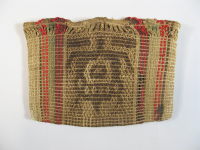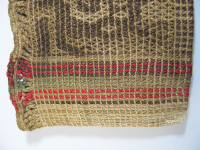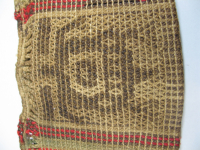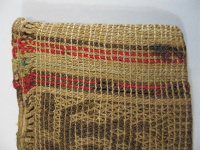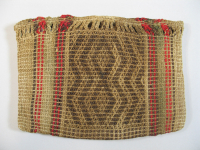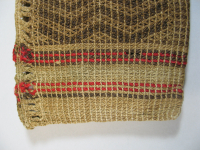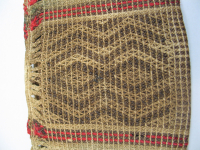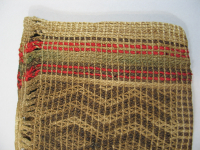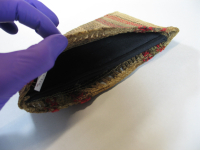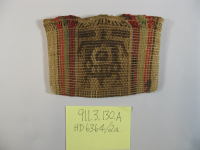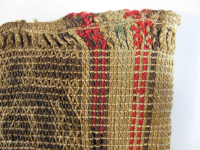wampum belt pouch
wampum belt pouch
wampum belt pouch
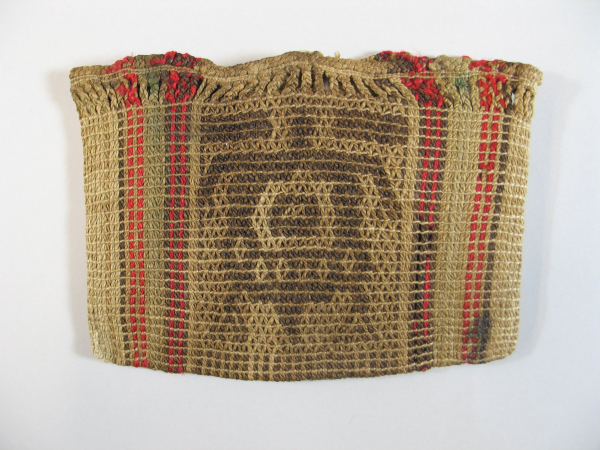
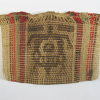
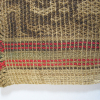
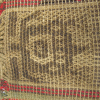
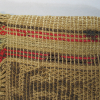
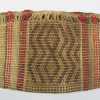
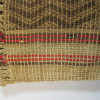
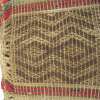
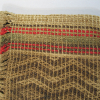
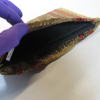
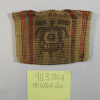
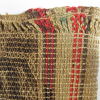
Bag made of finger woven or twined fiber, with some fibers dyed bright red, green and brown. Image of a turtle on one side of the bag flanked by parallel lines; and two sets of opposed zig-zag lines also flanked by parallel lines on the reverse side of the bag. Although it is associated with the Penn Wampum Belt, this bag is likely to have been created later, and Anishinaabe in origin. Dr. Oronhyatekha Ethnology collection.
Although this bag is associated with the Penn Wampum belt, it is likely to be later than the belt and Anishinaabe in origin (see above) rather then from the Pennsylvania region.
GRASAC generated by AN
Read More About This Relative
Nettlestalk fibre, some of the fibres dyed bright red, green (maybe originally blue), and brown
Finger woven or twined bag
Turtle on one side, two sets of opposed parallel zig-zag lines on the other side
The colour of the red is unusually bright and has a pink cast. It should be researched as a possible way of dating the bag.
Provenance
F. Barlow Cumberland, Catalogue and Notes of the Oronhyatekha Historical Collection (Toronto: Independent Order of Foresters, 1904), p 58,
Item 373. "Penn Wampum Belt Pouch. Grass pouch in which the Penn Wampum Belt was kept. The tribal emblem of the Turtle is worked in the fabric on one side."
About This GRASAC Record
Unknown Anishinaabe artist, wampum belt pouch. Currently in the Royal Ontario Museum, 911.3.130 A. Item photographed and described as part of a GRASAC research trip December 2008; GRASAC item id 1475.
GRASAC team research trip to the Royal Ontario Museum, Dec 15-19 2008, funded by SSHRC Aboriginal Research Grant. Participants: Heidi Bohaker, Alan Corbiere, Lewis Debassige, Anne De Stecher, Darlene Johnston, Stacey Loyer, Trudy Nicks, Ruth Phillips
Dec 17 ethnology team: Trudy Nicks, Alan Corbiere, Cory Willmott, Anne De Stecher, Stacey Loyer, Ruth Phillips assisted by Tracey Forester













This type of bag is documented to this region both by the earliest collected examples in the Jasper Grant collection, made in the Windsor ON region from 1805-1809 and by later bags in the Detroit Institute of Arts and other museums documented to the Odawa, Ojibwe, and other neighbouring peoples.
 Knowledge Sharing Platform
Knowledge Sharing Platform

